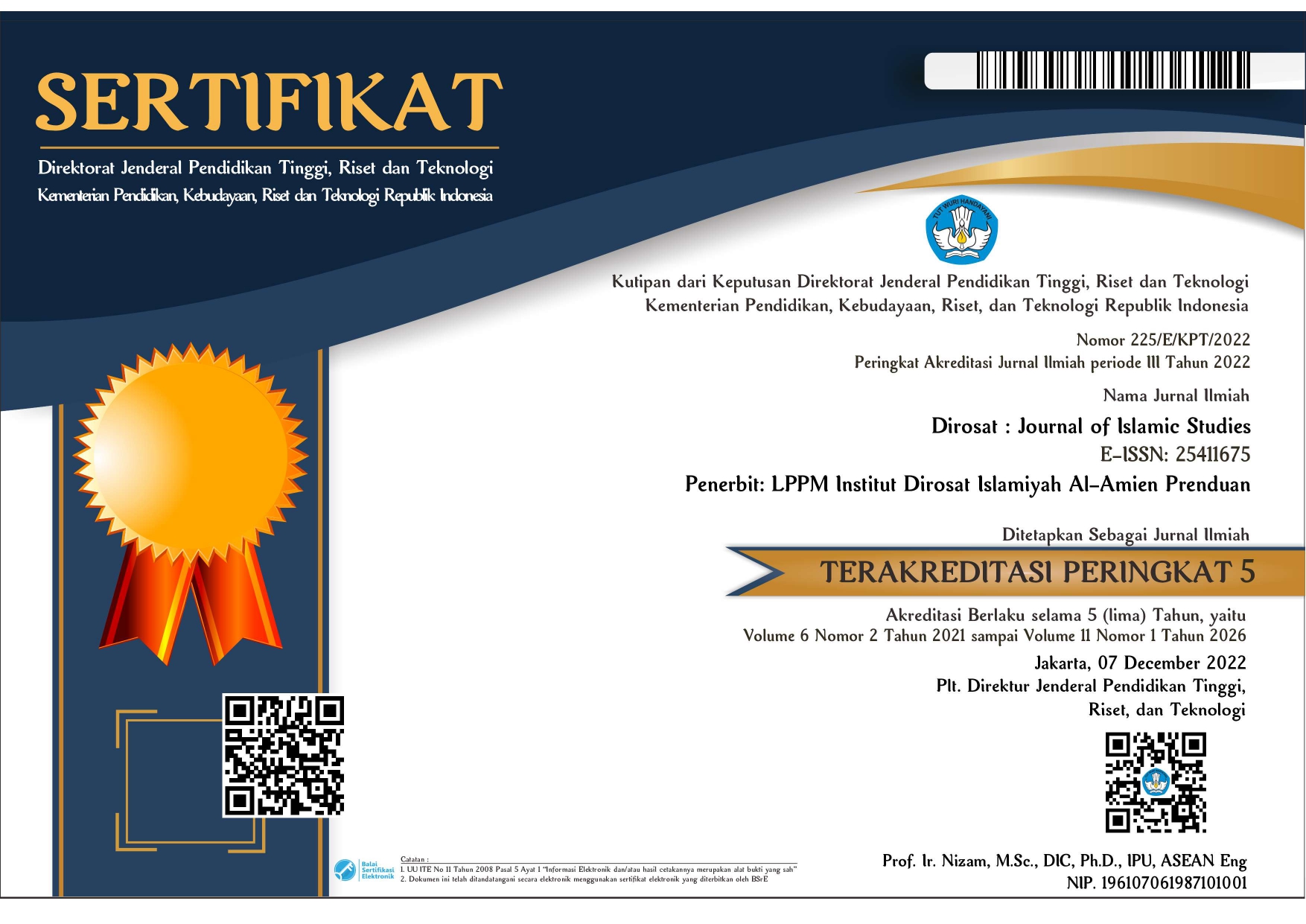Muslim World and the Globalisation Challenge: [En]Countering Dehumanization or Humanised Integration
Abstract
References
Arief, Sritua. Negeri Terjajah: Menyingkap Ilusi Kemerdekaan. Yogyakarta: Resist Book, 2006.
Azizy, Qodri. Melawan Globalisasi: Reinterpretasi Ajaran Islam, Persiapan SDM dan Terciptanya Masyarakat Madani. Yogyakarta: Pustaka Pelajar, 2003.
Barry F. Seidman and Neil J. Murphy (eds.). Toward a new political humanism. Amherst, NY: Prometheus Books, 2004.
Baswir, Revrisond. Bahaya Neoliberalisme. Yogjakarta: Pustaka Pelajar, 2009.
Chomsky, Noam. Profit Over People: Neoliberalism and Global Order. New York: Seven Stories Press, 1999.
Dahana, Radhar Panca. Ekonomi Cukup: Kritik Budaya pada Kapitalisme. Jakarta: Kompas, 2015.
Dierckxsens, Wim. The Limits of Capitalism: An Approach to Globalization without Neoliberalism. London: Zed Books, 2000.
Drilik, Arif. The End of Colonialism? The Colonial Modern in the Making of Global Modernity. Boundary 2, 32:1, 2005.
Fakih, Mansour. Runtuhnya Teori Pembangunan dan Globalisasi. Yogjakarta: Pustaka Pelajar & Insist Press, 2008.
Fakih, Mansour. Jalan Lain: Manifesto Intelektual Organik. Yogyakarta: Pustaka Pelajar, 2011.
Freire, Paulo. Pedagogy of Solidarity. California: Left Coast Press, 2014.
Giroux, Henry A. Neoliberalism’s War on Higher Education. Chicago: Haymarket Books, 2014.
Hussin, Rosazman, et al. Globalisasi: Beberapa Pendekatan Sains Sosial. Kuala Lumpur: DBP, 2001.
Kessler, Clive S. Globalization: another false universalism, Third World Quarterly, Vol. 21, No.6, 2000.
Miyoshi, Masao. Sites of Resistance in the Global Economy. Boundary 2, 22:1, 1995.
Miyoshi, Masao. The University, the Universe, the World, and “Globalization. The Global South, Vol. 1, 1, 2007.
Miyoshi, Masao. The University and the “Gloval†Economy: The Case of the United States and Japan. The South Atlantic Quarterly, 99, 4, 2000.
Musa, M Bakri. Malaysia in the Era of Globalization. San Jose: Writers Club Press, 2002.
Nugroho, Tarli. Polemik Ekonomi Pancasila. Yogyakarta: Mubyarto Institute, 2016.
Prasetyo, Eko. Islam Kiri: Jalan Menuju Revolusi Sosial. Yogyakarta: Insist Press, 2004.
Prasetyo, Galih. Indonesia dalam Cengkraman Liberalisme: Krisis, IMF dan Jalan Pemulian Ekonomi. Jakarta: Penerbit Koekoesan, 2015.
Prasetyo, Eko. Islam Kiri Melawan Kapitalisme Modal dari Wacana Menuju Gerakan. Yogyakarta: Pustaka Pelajar & Insist Press, 2002.
Seah Chee-Meow, ed. Asian Values and Modernization. Singapore University Press, 1977.
Wahid, Abdurrahman. Islamku, Islam Anda, Islam Kita. Jakarta: The Wahid Institute, 2006.
DOI: 10.28944/dirosat.v1i2.19
Refbacks
- There are currently no refbacks.

This work is licensed under a Creative Commons Attribution-NonCommercial-ShareAlike 4.0 International License.








